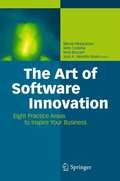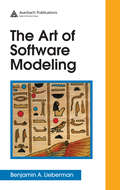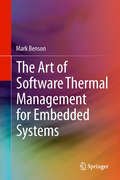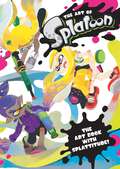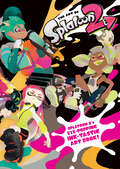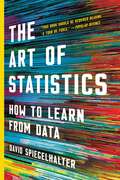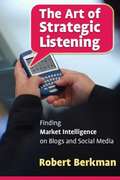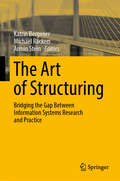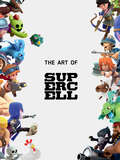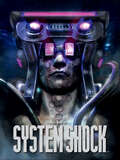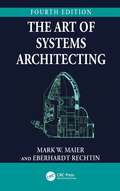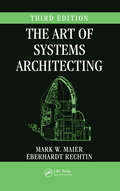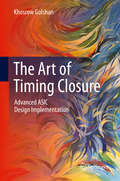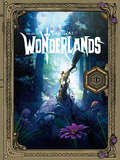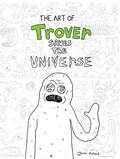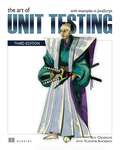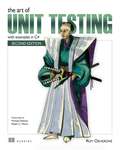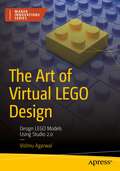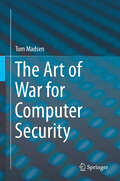- Table View
- List View
The Art of Software Innovation: Eight Practice Areas to Inspire your Business
by Nick Boucart Wim Codenie Minna Pikkarainen José Antonio Heredia AlvaroImagine that you are the CEO of a software company. You know you compete in an environment that does not permit you to treat innovation as a secondary issue. But how should you manage your software innovation to get the most out of it? This book will provide you with the answer. Software innovation is multifaceted and the approaches used by companies can be very different. The team of authors that wrote this book took the assumption that there is no such thing as a universal software engineering process or innovation process. Some things work well for a certain company, others do not. The book is organized around what the authors call eight fundamental practice areas for innovation with software. Each practice area contains a number of activities that can help companies to master that practice area. It also contains industrial experience reports that illustrate the applicability of these practice areas in software companies and is structured in such a way that you can select and read only those practice areas that are relevant to your company. The book is written with an industrial target audience in mind. Its most important goal is to challenge companies by offering them a framework to become more innovation-driven, rather than engineering-driven. Intrigued? Here you will find details of what you and your company can do to understand, implement, and sustain continuous innovation.
The Art of Software Modeling
by Benjamin A. LiebermanModeling complex systems is a difficult challenge and all too often one in which modelers are left to their own devices. Using a multidisciplinary approach, The Art of Software Modeling covers theory, practice, and presentation in detail. It focuses on the importance of model creation and demonstrates how to create meaningful models. Presenting three self-contained sections, the text examines the background of modeling and frameworks for organizing information. It identifies techniques for researching and capturing client and system information and addresses the challenges of presenting models to specific audiences. Using concepts from art theory and aesthetics, this broad-based approach encompasses software practices, cognitive science, and information presentation. The book also looks at perception and cognition of diagrams, view composition, color theory, and presentation techniques. Providing practical methods for investigating and organizing complex information, The Art of Software Modeling demonstrates the effective use of modeling techniques to improve the development process and establish a functional, useful, and maintainable software system.
The Art of Software Thermal Management for Embedded Systems
by Mark BensonThis book introduces Software Thermal Management (STM) as a means of reducing power consumption in a computing system in order to manage heat, improve component reliability and increase system safety. Readers will benefit from this pragmatic guide to the field of STM for embedded systems and its catalog of software power management techniques. Since thermal management is a key bottleneck in embedded systems design, this book focuses on root cause of heat in embedded systems: power. Since software has an enormous impact on power consumption in an embedded system, this book urges software engineers to manage heat effectively by understanding, categorizing and developing new ways to reduce static and dynamic power consumption. Whereas most books on thermal management describe mechanisms to remove heat, this book focuses on ways for software engineers to avoid generating heat in the first place.
The Art of Splatoon
by NintendoThe Art of Splatoon contains 320 inkredible pages of artwork, including 2D and 3D illustrations of your favorite characters, maps, concept art, weapon and gear design, storyboards, sketches, hand-drawn comics . . . and that's only an inkling of what's inside. We're not squidding around: this is a must have for all fans of Splatoon!Character illustrations!Concept art!Behind the scenes notes!All the content that splatters most!
The Art of Splatoon 2
by NintendoAn amaze-ink behind-the-scenes look at the making of Splatoon 2, one of the best-selling Nintendo Switch games of all time!Dive into over 380 pages worth of illustrations, key art, and designs of your favorite colorful characters, weapons, gear, locations, maps, and brands. The Art of Splatoon 2 also features storyboards and other extras sure to make a splash with any fan! Don't miss this ink-redible look at the best-selling family-friendly game Splatoon 2!
The Art of Star Wars Jedi: Survivor
by Respawn Entertainment Lucasfilm Ltd.An oversized, full-color hardcover art book collecting concept art and creator commentary from the next chapter in Cal Kestis&’ thrilling saga.Cal and his friends continue to evade the Empire&’s clutches in the dark times following Order 66, but just as a hidden hope reveals itself, new dangers emerge and threaten to destroy everything that the young Jedi has fought to preserve.Explore the creation of the newest Star Wars Jedi adventure with a tome that intimately chronicles the game&’s development—from visionary design to inspirational artwork to stunning final renders. With heroes and villains both familiar and new, breathtaking locales, and incredible ships and weapons, The Art of Star Wars Jedi: Survivor offers a unique look at the inner workings of a galaxy far, far away.
The Art of Star Wars Outlaws
by Massive EntertainmentA FULL-COLOR ART BOOK COLLECTING CONCEPT ART AND CREATOR COMMENTARY FROM THE FIRST-EVER OPEN-WORLD STAR WARS GAME, SET BETWEEN THE EVENTS OF THE EMPIRE STRIKES BACK AND RETURN OF THE JEDI.Developed by Massive Entertainment in collaboration with Lucasfilm Games, Star Wars Outlaws gives players the opportunity to explore distinct locations across the galaxy, both iconic and new, as Kay Vess—a scoundrel seeking freedom from her past with her companion Nix. As the unlikely heroes embark on a stars-spanning series of high-stakes missions, they constantly risk running afoul of rivaling gangs or falling into the clutches of the evil Galactic Empire.The Art of Star Wars Outlaws explores the creation of this underworld adventure with an expertly designed assembly of thrilling imagery and intimate insights from the game&’s creators. Now readers can get down and dirty as they acquaint themselves with charming rogues, plunge into alien environments, examine exotic tools and weapons, and see how Kay Vess was made to defy the odds.
The Art of Statistics: How to Learn from Data
by David SpiegelhalterThe definitive guide to statistical thinkingStatistics are everywhere, as integral to science as they are to business, and in the popular media hundreds of times a day. In this age of big data, a basic grasp of statistical literacy is more important than ever if we want to separate the fact from the fiction, the ostentatious embellishments from the raw evidence -- and even more so if we hope to participate in the future, rather than being simple bystanders.In The Art of Statistics, world-renowned statistician David Spiegelhalter shows readers how to derive knowledge from raw data by focusing on the concepts and connections behind the math. Drawing on real world examples to introduce complex issues, he shows us how statistics can help us determine the luckiest passenger on the Titanic, whether a notorious serial killer could have been caught earlier, and if screening for ovarian cancer is beneficial. The Art of Statistics not only shows us how mathematicians have used statistical science to solve these problems -- it teaches us how we too can think like statisticians. We learn how to clarify our questions, assumptions, and expectations when approaching a problem, and -- perhaps even more importantly -- we learn how to responsibly interpret the answers we receive.Combining the incomparable insight of an expert with the playful enthusiasm of an aficionado, The Art of Statistics is the definitive guide to stats that every modern person needs.
The Art of Strategic Listening: Finding Market Intelligence through Blogs and Other Social Media
by Robert BerkmanSocial media is the catch-all name for blogs, Web forums, YouTube, MySpace, FaceBook and the other internet-based sites where consumers converse and share content. All of this unsolicited and authentic discussion and opinion can be a great source of marketplace insight for companies. From paying close attention to consumer discussions on blogs and other social media, you can discover what new products or product features consumers would like to see, and stay alert to emerging trends in your industry that could create new opportunities for your company.Robert Berkman, an experienced information specialist with several books to his credit, gives detailed directions for specialized blog searches, setting up RSS feeds, and tracking buzz. He also provides detailed information about vendors who supply blog monitoring services and discusses the pros and cons of using vendors or doing it yourself.For marketers, public relations firms, strategic business analysts, and corporate planners, this book gives you everything you need to know to begin finding market intelligence in social media. You will learn to look for trends, distinguish a trend from a fad, and determine the credibility of the information you uncover. Moreover, Berkman provides you with tips on organizing all the information you find to help you sift through it, locate just the valuable and relevant content, and reduce information overload.
The Art of Structuring: Bridging the Gap Between Information Systems Research and Practice
by Armin Stein Katrin Bergener Michael RäckersStructuring, or, as it is referred to in the title of this book, the art of structuring, is one of the core elements in the discipline of Information Systems. While the world is becoming increasingly complex, and a growing number of disciplines are evolving to help make it a better place, structure is what is needed in order to understand and combine the various perspectives and approaches involved. Structure is the essential component that allows us to bridge the gaps between these different worlds, and offers a medium for communication and exchange. The contributions in this book build these bridges, which are vital in order to communicate between different worlds of thought and methodology – be it between Information Systems (IS) research and practice, or between IS research and other research disciplines. They describe how structuring can be and should be done so as to foster communication and collaboration. The topics covered reflect various layers of structure that can serve as bridges: models, processes, data, organizations, and technologies. In turn, these aspects are complemented by visionary outlooks on how structure influences the field.
The Art of Super Mario Odyssey
by NintendoTake a globetrotting journey all over the world--and beyond!--with this companion art book to the hit video game for the Nintendo Switch(TM) system!In October of 2017, Super Mario Odyssey(TM) took the gaming world by storm. Now, discover the art and expertise that went into creating one of Nintendo's best-loved games! This full-color volume clocks in at over 350 pages and features concept art, preliminary sketches, and notes from the development team, plus insight into some early ideas that didn't make it into the game itself! Explore the world of Super Mario Odyssey from every angle, including screen shots, marketing material, and more, to fully appreciate this captivating adventure
The Art of Supercell: 10th Anniversary Edition
by SupercellA first-of-a-kind tome that includes a plethora of art along with commentary showcasing the development of all the Supercell games!!Chronicling each in release order, this volume is a must own for any fan of Clash of Clans, Brawl Stars, Hay Day, Clash Royale, and Boom Beach. Explore each aspect of these games, from developmental concept pieces, to finished, fully rendered environmental shots. This book also gives a one of a kind looks into the games that have never been released, as well as commentary from the Supercell team!Dark Horse Books and Supercell proudly present The Art of Supercell: 10th Anniversary Edition. A perfect retrospective for your collection!
The Art of System Shock
by Robb WatersA full-color hardcover art book chronicling the renowned Nightdive Studios&’ faithful recreation of the iconic cyber-sci-fi action thriller video game, System Shock!When a powerful artificial intelligence named SHODAN is liberated of her ethical constraints, the inhabitants of the Citadel space station are rapidly corrupted into bloodthirsty cyborgs and mutants and placed under her control. It&’s up to a resourceful rogue hacker to traverse the station level by level, battling the monstrous crew and computer-controlled robots before ultimately facing down with the AI herself! Now fans of the groundbreaking cyber-action shooter can explore the development of the lovingly recreated System Shock in intricate detail—including art of Citadel Station&’s mysterious interiors, vile enemies, clever props, and much more. Nightdive Studios and Dark Horse Books invite readers to relive the unforgettable experience of the classic game, remade with enormous care for a new generation. Celebrate the return to Citadel Station with The Art of System Shock.
The Art of Systems Architecting
by Mark W. Maier Eberhardt RechtinThe Art of Systems Architecting, Fourth Edition, provides structured heuristics to improve the least structured, most art‑like elements of systems design. It offers unique techniques to bridge the difference between scientific engineering and qualitative design along with comprehensive methods for combining architectural design with digital engineering. This book illustrates how to go from model‑based systems architecture to model‑based systems engineering and includes case studies of good and bad architectural decision‑making in major systems.Changes to this edition include materials on architecture processes, architecture description frameworks, and integration with model‑based systems engineering (MBSE) and digital engineering. The publication of the ANSI/IEEE 1471 and ISO/IEC 42010 standards on architecture description has provided common vocabulary and organizing methods for documenting architectures. This edition provides a practical application of these standards in architecting and integrating their concepts with a simple process framework. The rise of MBSE and digital engineering tools is in the process of revolutionizing the development of complex systems. The emphasis has been on detailed design descriptions and powerful analysis methods (for example, digital twins). Architects can make effective use of these methods and tools as well, and this new edition provides an integrated set of heuristics and modeling methods to do so. There are many other improvements and additions included to bring this textbook up to date.This book can be used as a reference book for engineers and managers involved in creating new systems, people responsible for developing mandated architecture descriptions, software architects, system architects, and systems engineers, or as a textbook in graduate engineering courses.Exercises are interspersed throughout the text, with some designed for self‑testing and understanding and others intended to provide opportunities for long‑term study and further exploration of the subject.
The Art of Systems Architecting (Systems Engineering)
by Mark W. MaierIf engineering is the art and science of technical problem solving, systems architecting happens when you don't yet know what the problem is. The third edition of a highly respected bestseller, The Art of Systems Architecting provides in-depth coverage of the least understood part of systems design: moving from a vague concept and limited resources
The Art of The Last of Us (The Last of Us)
by VariousNaughty Dog Studios and Dark Horse proudly present the essential companion to The Last of Us, a richly detailed and compelling game set in a postpandemic world where humans have become an endangered species. Featuring concept art, character designs, and astonishing settings and landscapes, The Art of The Last of Us provides a unique look at one of the gaming world's most eagerly anticipated titles. * A must-have companion to the game. * Incredible full-color artwork! * The latest project from Naughty Dog Studios. * The Last of Us swept the top Game Critics awards at 2012's E3 conference.
The Art of The Mass Effect Universe (Mass Effect)
by Casey HusdonThe Mass Effect trilogy is a groundbreaking epic that has immersed gamers in one of science fiction's richest universes. Now BioWare and Dark Horse are proud to invite fans deeper than ever into the Mass Effect saga with The Art of the Mass Effect Universe! Featuring concept art and commentary by BioWare on the games' characters, locations, vehicles, weapons, and more (including Mass Effect 3) The Art of the Mass Effect Universe is the most complete companion available to gaming's most compelling series!
The Art of Timing Closure: Advanced ASIC Design Implementation
by Khosrow GolshanThe Art of Timing Closure is written using a hands-on approach to describe advanced concepts and techniques using Multi-Mode Multi-Corner (MMMC) for an advanced ASIC design implementation. It focuses on the physical design, Static Timing Analysis (STA), formal and physical verification. The scripts in this book are based on Cadence® Encounter System™. However, if the reader uses a different EDA tool, that tool’s commands are similar to those shown in this book.The topics covered are as follows:Data StructuresMulti-Mode Multi-Corner AnalysisDesign ConstraintsFloorplan and Timing Placement and TimingClock Tree SynthesisFinal Route and TimingDesign SignoffRather than go into great technical depth, the author emphasizes short, clear descriptions which are implemented by references to authoritative manuscripts. It is the goal of this book to capture the essence of physical design and timing analysis at each stage of the physical design, and to show the reader that physical design and timing analysis engineering should be viewed as a single area of expertise.This book is intended for anyone who is involved in ASIC design implementation -- starting from physical design to final design signoff. Target audiences for this book are practicing ASIC design implementation engineers and students undertaking advanced courses in ASIC design.
The Art of Tiny Tina's Wonderlands
by Amy RatcliffeA fantastic, full-color, oversized hardcover that chronicles the making of Gearbox&’s genre-mashing looter shooter!Go beyond the Borderlands with The Art of Tiny Tina&’s Wonderlands! Embark on a chaotic adventure that reimagines a cast of unforgettable characters as players journey through the Wonderlands. Admire the details of Tiny Tina&’s tabletop world in this handsome hardcover filled with the unique concept art of the environments, creatures, weapons, and characters we all know and love from the minds behind the Borderlands franchise! Join in the fun and become the ultimate Fatemaker by exploring The Art of Tiny Tina&’s Wonderlands! If you don't get it, Tiny Tina is gonna start crying!
The Art of Trover Saves the Universe
by Squanch GamesAn oversized full-color art book showcasing the insane imagination of Rick and Morty co-creator Justin Roiland! Save the universe! Save your dogs! Take your chair to the streets and follow Trover throughout the cosmos as you battle your way through hordes of clones on your quest to stop Glorkon! This freaky and awesome hardcover art book is the perfect companion to Squanch Games's first full length game! Feast your eye holes on 192 pages of crazy concept art and intimate commentary! Dark Horse Books and Squanch Games invite you to embrace weirdness by picking up the greatest art book in the galaxy! Or don't. It's whatever. I'm not your dad.
The Art of Uncharted 4: A Thief's End
by VariousJourney alongside Nathan Drake once again, as Naughty Dog and Dark Horse Books team up to bring you this comprehensive and breathtaking exploration into Uncharted 4: A Thief's End! Numerous never-before-seen designs and concept art accompanied by commentary from the developers give you behind-the-scenes access to the creation of this gaming masterwork. This beautiful oversized hardcover is a must-have for any fan of the Uncharted franchise and high quality video game art.The Art of Unchartend 4 will be released by Dark Horse simultaneoulsy with the new game, Uncharted 4.
The Art of Unit Testing, Third Edition: with examples in JavaScript (The Art of)
by Roy OsheroveUnit testing is more than just a collection of tools and practices—it&’s a state of mind! This bestseller reveals the master&’s secrets for delivering robust, maintainable, and trustworthy code.Thousands of developers have learned to hone their code quality under the tutelage of The Art of Unit Testing. This revised third edition updates an international bestseller to reflect modern development tools and practices, as well as to cover JavaScript. Inside The Art of Unit Testing, Third Edition you will learn how to: Create readable, maintainable, and trustworthy tests Work with fakes, stubs, mock objects, and isolation frameworks Apply simple dependency injection techniques Refactor legacy code with confidence Test both frontend and backend code Effective unit tests streamline your software development process and ensure you deliver consistent high-quality code every time. With practical examples in JavaScript and Node, this hands-on guide takes you from your very first unit tests all the way to comprehensive test suites, naming standards, and refactoring techniques. You&’ll explore test patterns and organization, working with legacy code and even &“untestable&” code. The many tool-agnostic examples are presented in JavaScript and carefully designed so that they apply to code written in any language. About the technology The art of unit testing is more than just learning the right collection of tools and practices. It&’s about understanding what makes great tests tick, finding the right strategy for each unique situation, and knowing what to do when the testing process gets messy. This book delivers insights and advice that will transform the way you test your software. About the book The Art of Unit Testing, Third Edition shows you how to create readable and maintainable tests. It goes well beyond basic test creation into organization-wide test strategies, troubleshooting, working with legacy code, and &“merciless&” refactoring. You&’ll love the practical examples and familiar scenarios that make testing come alive as you read. This third edition has been updated with techniques specific to object-oriented, functional, and modular coding styles. The examples use JavaScript. What's inside Deciding on test types and strategies Test Entry & Exit Points Refactoring legacy code Fakes, stubs, mock objects, and isolation frameworks Object-Oriented, Functional, and Modular testing styles About the reader Examples use JavaScript, TypeScript, and Node.js. About the author Roy Osherove is an internationally-recognized expert in unit testing and agile software methodology. Vladimir Khorikov is the author of Manning&’s Unit Testing Principles, Practices, and Patterns, a Pluralsight author, and a Microsoft MVP. Table of Contents PART 1 1 The basics of unit testing 2 A first unit test PART 2 3 Breaking dependencies with stubs 4 Interaction testing using mock objects 5 Isolation frameworks 6 Unit testing asynchronous code PART 3 7 Trustworthy tests 8 Maintainability PART 4 9 Readability 10 Developing a testing strategy 11 Integrating unit testing into the organization 12 Working with legacy code Appendix Monkey-patching functions and modules
The Art of Unit Testing: with examples in C#
by Roy OsheroveSummaryThe Art of Unit Testing, Second Edition guides you step by step from writing your first simple tests to developing robust test sets that are maintainable, readable, and trustworthy. You'll master the foundational ideas and quickly move to high-value subjects like mocks, stubs, and isolation, including frameworks such as Moq, FakeItEasy, and Typemock Isolator. You'll explore test patterns and organization, working with legacy code, and even "untestable" code. Along the way, you'll learn about integration testing and techniques and tools for testing databases and other technologies.About this BookYou know you should be unit testing, so why aren't you doing it? If you're new to unit testing, if you find unit testing tedious, or if you're just not getting enough payoff for the effort you put into it, keep reading.The Art of Unit Testing, Second Edition guides you step by step from writing your first simple unit tests to building complete test sets that are maintainable, readable, and trustworthy. You'll move quickly to more complicated subjects like mocks and stubs, while learning to use isolation (mocking) frameworks like Moq, FakeItEasy, and Typemock Isolator. You'll explore test patterns and organization, refactor code applications, and learn how to test "untestable" code. Along the way, you'll learn about integration testing and techniques for testing with databases.The examples in the book use C#, but will benefit anyone using a statically typed language such as Java or C++.Purchase of the print book includes a free eBook in PDF, Kindle, and ePub formats from Manning Publications.What's InsideCreate readable, maintainable, trustworthy testsFakes, stubs, mock objects, and isolation (mocking) frameworksSimple dependency injection techniquesRefactoring legacy codeAbout the AuthorRoy Osherove has been coding for over 15 years, and he consults and trains teams worldwide on the gentle art of unit testing and test-driven development. His blog is at ArtOfUnitTesting.com.Table of ContentsPART 1 GETTING STARTEDThe basics of unit testingA first unit testPART 2 CORE TECHNIQUESUsing stubs to break dependenciesInteraction testing using mock objectsIsolation (mocking) frameworksDigging deeper into isolation frameworksPART 3 THE TEST CODETest hierarchies and organizationThe pillars of good unit testsPART 4 DESIGN AND PROCESSIntegrating unit testing into the organizationWorking with legacy code Design and testability
The Art of Virtual LEGO Design: Design LEGO Models Using Studio 2.0
by Vishnu AgarwalHave you ever dreamed of designing your own LEGOs? Do you love building huge LEGO models, but don’t have enough bricks? This book will show you how to do all that and more with Bricklink Studio 2.0, a software program that's widely used by LEGO designers to create LEGO models virtually before making them with real LEGO bricks. You'll learn how to start a new project, use the camera control options, and drag and drop parts into your building plate. Then take your bricks from a pile of random pieces into intricate masterpiece models using building tools like Select, Hinge, Clone, Hide, Connect, Collision, and more! You’ll master all the building tools that help you build LEGO models. Then you’ll learn to search and manage LEGO bricks in Studio 2.0 using different palette options like Master, Hidden parts, and Custom parts. Beyond the official LEGO colors, there are special color options you can use to render neon, glow in the dark, and translucent brick. Use this expanded color palette to add to the complexity of your models, and then render your model to see it realistically in 3D! You’ll also learn to animate your model and watch it come to life. After finishing your design, you’ll learn to share what you’ve built with the world. You’ll create professional LEGO instructions for your model that can be printed or shared. Making you a true LEGO design master! What You'll LearnMake fascinating models with virtual LEGO bricks Design LEGO models more efficiently with Studio 2.0’s powerful tools Use “Build Together” simultaneously with another designer on the same project Build massive, amazing models on a small budget Who This Book Is ForAnyone interested in digital modelling or who loves building with LEGOs. Students, hobbyists, and enthusiasts will find fun learning activities.
The Art of War for Computer Security
by Tom MadsenIn this book the author draws inspiration from Sun Tzu's Art of War, a work that explains conflict between nations, and he applies this to the computer security setting, examining how we should consider protecting information systems from accidents or malicious attacks. The author first briefly introduces Sun Tzu. Then each chapter in the book takes its inspiration from an original title in The Art of War, where the author offers a general introduction to the content and then describes its application in a cybersecurity setting. These chapters cover estimates; waging war; offensive strategy; how you prepare for an attack; energy; weaknesses and strengths; the variables that need consideration before embarking on a war; how infrastructure is related to the concept of ground; attack by fire or how skilled attackers hide behind noise; and employing secret agents. The book will be interesting for computer security researchers and professionals who would like some grounding in a security mindset.
